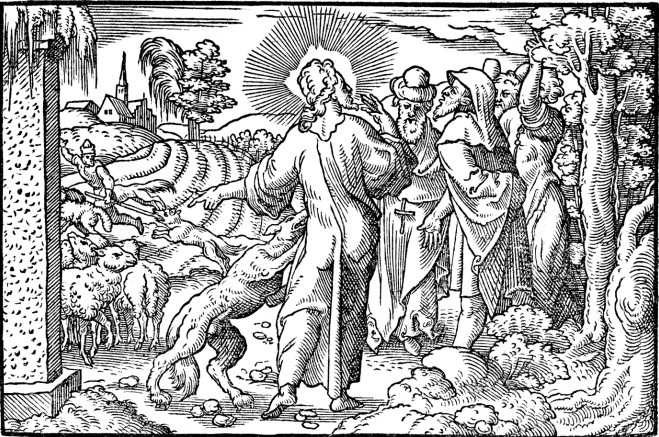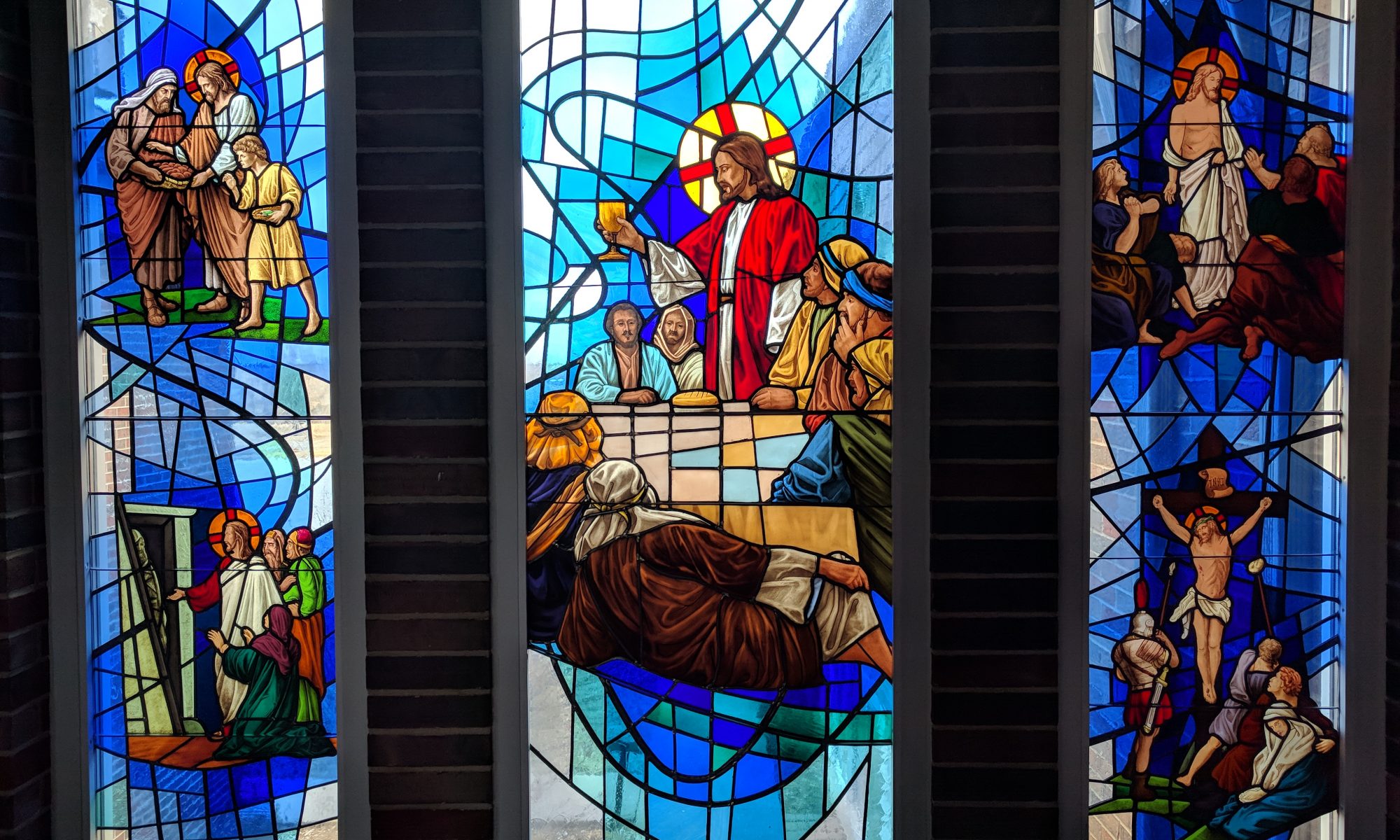
Lessons: Psalm 23, Ezekiel 34:11-16, 1 Peter 2:21-25, John 10:11-16
Hymns: LSB 709, 710, 459, 666, 692, 633, 740, 467, 864
Grace, mercy, and peace to you from God our Father and our Lord and Savior, Jesus Christ. Amen.
All three of our readings today focus on the Good Shepherd. It is very fitting that the Church has chosen to observe the Sunday of the Good Shepherd during the Easter season, for the risen Lord is our Good Shepherd. He sits at the right hand of the Father where He continues to lovingly Shepherd us as His people.
Our Old Testament readings last week and this week are from the book of Ezekiel. Last week we heard about the Valley of Dry Bones. The bones were very dry. But Ezekiel, under the command of God, prophesied that these bones would gain flesh and they did. Flesh and skin covered the bones that were once dry, but there was no breath in them. So, Ezekiel prophesied under the command of God, saying, “Come from the four winds, O breath, and breathe on these slain, that they may live.” And the bones rose—a great army (Ezekiel 37:1-14).
That is one of the Old Testament teachings concerning the Resurrection. Did you know there was a group of Jewish leaders known as the Sadducees who denied the resurrection? Yet, God spoke of the Resurrection in the Old Testament like He did in Ezekiel 37.
Breathing was an important concept for the bones to come back to life. In the Hebrew language, the same word was used for wind, breath, and spirit. So, the wind came, bringing breath to the bodies which had been dry bones—by the working of the Holy Spirit.
The day Jesus rose from the dead He appeared before His disciples saying, “Peace be with you.” Then He breathed on His disciples, saying, “Receive the Holy Spirit. If you forgive the sins of any, they are forgiven them; if you withhold forgiveness from any, it is withheld” (John 20:19-23). Jesus breathed on them to grant them the Holy Spirit.
The disciples received the Holy Spirit to perform the task of under-shepherds. They remained under the authority of Jesus, and their task was to do the work of Christ. They were commissioned by the Good Shepherd to feed God’s lambs—to shepherd them. And Jesus explained to them how they would shepherd God’s people—by forgiving sinners and by withholding forgiveness from some.
Their work of forgiving and retaining sins was never arbitrary. They didn’t flip a coin, saying, “Heads, you’re forgiven” or “Tails, you’re not forgiven.” They were not to limit forgiveness to only those who seemed nicer, richer, or better. Instead, the standard they were to use was the one taught by the Shepherd Himself. Just as Christ preached the Law to drive sinners to repentance, so Christ’s under-shepherds do the same. Just as Jesus preached the Gospel as He announced the grace of God freely available to all, so do Christ’s under-shepherds. Forgiveness is granted to the penitent. Withholding forgiveness is to be done to the impenitent as long as they do not repent.
When this is being done faithfully, then the work of Christ the Good Shepherd is being done.
Sadly, this is not always done among those who claim to be ministers. Jesus speaks about the hireling who does not own the sheep and does not care for the sheep. This type of hireling does not stick with the sheep when the wolf is coming. He flees and then the wolf snatches the sheep and scatters them.
But Jesus never will. Nor do the true under-shepherds whom Christ Jesus sends. True ministers will preach in season and out of season. They will warn and reprove, rebuke and correct (2 Tim. 4:2). They will bring the comfort of the Gospel to hurting souls. They will shepherd God’s people by being there for them, keeping watch over them through prayer, and feeding them the Word and the Sacrament.
In our reading from Ezekiel, we heard that, as the Shepherd, God will gather His sheep together and feed them. This is what it means to be the Church. Consider these words from Martin Luther in our Lutheran Confessions: “Thank God, a seven-year-old child knows what the church is, namely, holy believers and sheep who hear the voice of the Shepherd. So children pray, ‘I believe in one holy Christian church.’ Its holiness . . . consists of the Word of God and true faith” (SA III XII 2-3) Such a beautiful thing! Hearing the voice of God, believing His Word—for our salvation—as a free gift of grace!
But earlier in the chapter, Ezekiel prophesied against the shepherds of Israel, saying, “Ah, shepherds of Israel who have been feeding yourselves! Should not shepherds feed the sheep? The weak you have not strengthened, the sick you have not healed, the injured you have not bound up, the strayed you have not brought back, the lost you have not sought, and with force and harshness you have ruled them. So they were scattered, because there was no shepherd, and they became food for all the wild beasts” (Ezekiel 34:3-5). Here God accuses those religious leaders who did not do what God sent them to do. God’s under-shepherds are tasked with very serious work. It is literally life or death for the Christian soul! There are eternal consequences. Evidently, there were clergy who were too inwardly focused or were preaching for prestige, money, or honor. This also went on in the years leading up to the Reformation. And, sadly, there’s plenty of this still going on today. Most TV evangelists and megachurch pastors are not shepherding God’s people through faithful preaching or properly administering the Sacraments.
There are many false teachers out there who claim to come in the name of the Lord. They can sound friendly. They may seem to be shepherding better than the true under-shepherds of Christ. And they may have big, successful-looking churches.
But we must be on guard. We must use discernment. God’s people are to listen to the voice of their Good Shepherd. They must learn to distinguish truth from error. And it is given to you—as God’s sheep—to judge your own shepherd.
Yes, you are tasked by God to ensure that your own shepherd—your pastor—faithfully proclaims the Word of God to you. After all, Jesus said in John 10:11-16, “My sheep know Me. They listen to My voice.” As you grow in the doctrine of Christ by studying the Scriptures, your ability to discern truth from error increases. You need the pure Word of God proclaimed to you, so that you can faithfully fulfill your duty to insist on that pure Word from your pastor.
Sadly, many do not want their pastors to be interested in the pure Word. In addition to ministers being tempted to do otherwise, so also God’s people are often tempted to receive something other than God’s truth. The Holy Spirit inspired St. Paul to write in 2 Tim 4:3-4, “The time is coming when people will not endure sound teaching, but having itching ears they will accumulate for themselves teachers to suit their own passions, and will turn away from listening to the truth and wander off into myths.”
If this describes you, repent. It is foolish to depart from God’s Word. And plus, there’s nothing better than to hear the pure Word of Christ, for Jesus alone sets you free from your sin. That’s how Jesus shepherds you. And if you depart from Him and His Word, how do you think salvation would otherwise come to you?
Others don’t want their pastors to shepherd them because they want to take the route of the tough (which is really the route of the weak) and insist they do not need pastoring. They do not desire prayers. They do not want their pastor to make visits. They claim they are fine. They want to prove how strong they are.
But that’s why God sends flesh and blood. He sends humans to pastor God’s people. He knows how weak sheep really are and how badly they need help. So, when you are feeling down, when you are struggling with temptation or sin, when you are facing hard times in your lives, when you are sick or injured, contact your pastor. Let him know. At the very least, your pastor can pray for you. The whole Church can pray for you. Your pastor is there to visit you with Christ’s gifts. And please, do not assume that your pastor may be too busy or have better things to do than to help you. Remember, you are the apple of God’s eye. He loves you. It is God who sends pastors to care for you. This is how you are shepherded by your Good Shepherd.
When you bring your cares and concerns to your Good Shepherd, God hears you. When you pray repeatedly, you do not bother Him. When you ask Him for help, you are not burdening Jesus. In the same way, when you make use of Christ’s under-shepherds (pastors), you are of no bother to them. That’s why Jesus sends pastors. To be there for you. To shepherd you. To pray for you. To help you. To fulfill the work of the ministry.
Pastors are to proclaim the Gospel purely and administer the Sacraments in accordance with Christ’s institution. They are to deal with sinners in the same way as Christ Himself would. They are to lead them to repentance and grant repentant sinners the absolution. They are to feed Christ’s lambs the life-giving Word of God. They are to Baptize sinners into God’s family. They are to welcome sinners to the altar who have given the same confession of the faith so that they may feed on Christ’s Body and Blood for their forgiveness.
In all of this, Christ the Good Shepherd is at work. He laid down His life to pay for the sins of the world. He is risen to Shepherd His flock, the Church. The Resurrection is sure and certain. Jesus shepherds you in love. He leads you through Word and Sacrament to the green pastures and still waters of Paradise. Amen.
The peace of God which passes all understanding keep your hearts and minds in Christ Jesus to life everlasting. Amen

